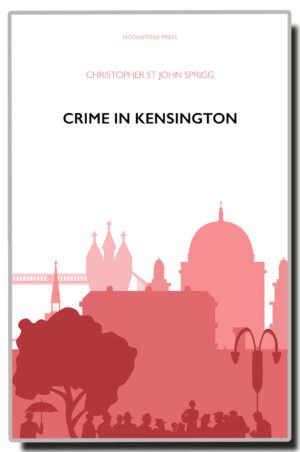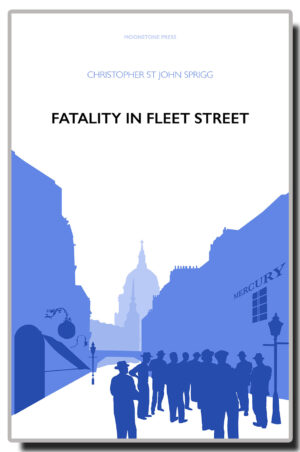The Perfect Alibi
“Good God, you don’t think it was an accident?”
Wealthy industrialist Anthony Mullins is found dead in a garage fire with the door locked. The locals assume it was an accident or perhaps suicide. But when the autopsy reveals a bullet wound to Mullins’ head and no revolver is found, a murder investigation ensues.
Was the killer his disgraced nephew Holliday, rumoured to be overly close to his wife? Or Patricia Mullins herself, whose inheritance relied on her husband’s death from natural causes? Or friend James Constant, who’s research society is the beneficiary of Mullins’ unusual will? It soon becomes apparent that everyone, including the victim, has something to hide.
Good-natured Police Constable Sadler and Inspector Trenton, are alternatively assisted and hampered by the efforts of the local residents to find the killer. At first, everyone appears to have a perfect alibi, but the more Sadler and Trenton probe, the murkier the picture becomes. Fortunately, journalist Charles Venables is on hand to help make sense of the conflicting and confusing evidence.
This classic detective novel from the 1930s is now back in print for the first time.
£9.99
By Christopher St John Sprigg
Author of Death of an Airman
First published in 1934 by Eldon Press Ltd
Paperback
286pp
ISBN 9781788000036
Interesting links:
A review of The Perfect Alibi on Pretty Sinister Books
Table of Contents
I Corpse at the Wheel
II Appearance of a Detective
III Murder or Suicide?
IV The Dead Hand Points
V Dr Marabout Sees the Devil
VI Interrogation of a Widow
VII A Shot in the Dark
VIII An Alibi is Shaken
IX Puzzle of a Pugilist
X Argument with an Artist
XI Evidence of a Diabolist
XII Strange Behaviour of a Peer
XIII A Horsewoman on the Warpath
XIV So He Shot Mullins
XV An Architect is Arrested
XVI Affair of a False Beard
XVII Confession of an Artist
XVIII A Woman is Silent
XIX A Small Boy Owns Up
XX A Tangle is Unravelled
XXI Home Thoughts in Isorb
XXII A Biologist Wants Blood
XXIII A Temporary Alliance
XXIV A Young Man is Tight
XXV A Young Man is Frightened
XXVI A Biologist Gets Blood
XXVII A Temporary Alliance Becomes Permanent
XXVIII A Chase Across Europe
XXIX A Matter of Identity
XXX How It Was Done
Epilogue
2 reviews for The Perfect Alibi
Only logged in customers who have purchased this product may leave a review.
Corpse At The Wheel
“That’s a damned odd smell,” remarked Miss Delfinage, looking up from the grooming of her racing mare, Jennie.
Her stable-maid sniffed, and nodded. “Perhaps it’s Lord Overture,” she suggested. “He ’s always burning queer things to save coal. Those old boots of his smelt very funny when he burned them the other day.”That’s a damned odd smell,” remarked Miss Delfinage, looking up from the grooming of her racing mare, Jennie.
Miss Delfinage, however, had gone to the stable door. “Heavens,” she exclaimed, “The Turrets is on fire!”
Several inhabitants of Fairview Estate (formerly Hake End), “Thameshire’s Fairest Pleasaunce” (see the advertisements), noticed this at the same time as Miss Delfinage. So did P.C. Sadler, of Great Hake, wearily pushing his hated bicycle up Oak Avenue (formerly Bog Lane) on his daily round. He acted promptly. He walked quickly into Mrs. Murples’ place, the New House, and phoned the Peppering Fire Brigade. He then sped on low gear up to The Turrets courtyard. The fire, happily, was not so serious as it looked, for The Turrets itself was not alight. It was the wooden garage beside it that was blazing, and this communicated with The Turrets only by a path covered with wooden roofing, borne on posts. The wooden shed was flaming with all the fury of a petrol-fed fire, and no one could go within three yards of it. But P.C. Sadler could and did confine the fire to the garage by hacking down the posts supporting the roofing, with the help of The Turrets gardener. This done, they sprayed on to the flames a jet of water from a garden hose led out of the scullery window. In spite of the advice of practically all the inhabitants of the Estate now assembled, this jet had no effect whatever.
In a quarter of an hour the Peppering Fire Brigade arrived, followed by two errand-boys, three tradesmen’s vans, several exhausted urchins and (five minutes later) a perspiring ice-cream tricycle.
Fairview Estate ’s faith in the Peppering Fire Brigade was shaken by what followed. There was a hydrant in the courtyard near the garage, but for some reason the Fire Brigade key did not fit it, and the united efforts of the firemen were unable to move the cock. After a long period, during which several hundred yards of fire-hose were pushed in and out of windows, accompanied by the shouts and arguments of the men, a jet was produced not much stronger than that already supplied by the garden hose. Under cover of this, the firemen began to hack at the doors with their axes.
An unsympathetic onlooker remarked loudly, “If you ask me, the fire brigade’s doing more damage than the fire.”
The captain of the brigade himself seemed to feel that some apology was needed.
“If only the Council would have let us have that foam extinguisher like I asked for, we’d have had this petrol fire out in two minutes,” he explained to Mrs. Mullins, the young mistress of The Turrets.
She smiled nervously. “I’m not sure that I’m sorry. When my husband comes back from the office and finds our old car burned up, he ’ll simply have to buy that Bentley he ’s promised me so long. He’ll probably accuse me of starting the fire myself!”
“Well, there’s nothing like looking on the bright side of things, is there, madam? Now then, Simpson, what’s the matter with you? You look as if you’d seen a ghost.”
Simpson’s face was white beneath the smuts of the smoke— alarmingly white.
“There’s something in there,” he said, with a limp gesture towards the splintered garage door. “In the driving-seat of the car—dead—all charred up…”
Miss Delfinage, with her usual coolness, caught Mrs. Mullins as she fell backwards with a stifled cry…
II
Miss Delfinage, too, was quite naturally with Mrs. Mullins when she called at Peppering Police Station to complete the dreadful task of identification. Samson, manager of Antony Mullins’ firm, Morphopoulos & Mullins, Engineers, was also there, and together they looked at the charred remains beneath the sheet.
Inspector Trenton, who had been expecting a scene after the faint in the courtyard, admired her fortitude. Patricia Mullins’ face was drained of its blood beneath her jet-black hair, and her voice trembled. But she looked as unflinchingly as Samson at what had once been alive, and at the melted pince-nez, and the charred clothes, and the pocket-book—and Samson’s face was white enough.
“To think that he was joking with me when he left to go home for lunch this morning,” Samson said, impressed as men so irrationally are by the unceremonious haste of death. He drew a handkerchief from the tails of his morning-coat and wiped his lips.
They joined Miss Delfinage in the waiting-room.
Trenton, the formalities of identification completed, was anxious to collect any information he could, unofficially.
“Oh, he told you he was going home?” he said, answering the other’s remark.
Samson nodded.
“I can’t understand it,” murmured Mrs. Mullins. “He told me he wouldn’t be home for lunch. He’d never come home before suddenly without at least phoning me!”
“Perhaps the phone was out of order,” remarked Miss Delfinage. “You know what the Fairview Estate telephone lines are. A tree’s always falling across them or something.”
Inspector Trenton mentally noted Mrs. Mullins’ remark and Miss Delfinage’s comment. Already, beneath his sympathetic manner— genuine enough, for the dazed look in Mrs. Mullins’ lovely eyes would wake pity in anyone—already Trenton was keenly debating possibilities. On him, after all, largely depended what the verdict recorded by Dr. Ogleby should be. A word with the manager on the financial health of Morphopoulos & Mullins would be necessary and helpful.
III
Although the manager’s mind at the outset had recurred to his conventional last words with Mullins, they soon went farther back, to a conference they had had two days earlier.
Samson was not a fool. He was a shrewd business man, with that keen sense for character which is the real foundation of such shrewdness. There had been something fishy about that conference. There was something fishy about Mullins’ death. Consequently the two things linked up in his mind.
The occasion of the conference was a decision to send Ralph Holliday, Mullins’ nephew and junior partner, abroad. That was natural enough, for nearly all the firm’s business was foreign. The oddity consisted in the instructions given to Holliday.
These in themselves would also have been capable of explanation.
Morphopoulos & Mullins were engineers, a conveniently general term which in their case meant the making of guns, tanks, rifles, machine-guns, bombs, shells and torpedoes in their Lanarkshire factory. Odd things happen in an armament business. Morphopoulos was a clever little Greek who had turned late in life from the business of drug peddling, with its dangers, to the wholly safe business of selling guns. He had entered into partnership with Mullins, who knew nothing about selling but was a brilliant engineer with more than a brilliance in invention. Mullins produced the guns, Morphopoulos sold them.
When Morphopoulos dropped down dead on his yacht in the Mediterranean, sentimentally enough leaving his share of the business to Mullins, he had built up an international system of graft, in all the smaller European countries, which was unique. Mullins had been content to leave all this to the agents appointed by Morphopoulos. That kind of thing worried him. But now, he had explained to Samson and Holliday at the conference, something ought to be done about the sales organization. His suggestion was that Holliday should go away for a year or two and travel round Europe, prying into their agents’ affairs, and local affairs generally, to see if the organization could be improved.
It was quite natural to pick Holliday for this job. Samson was kept busy enough on routine, coordinating the London office and the Scottish factory, where he spent every other week with the foreign agencies. Mullins, as he himself had the sense to admit, was an engineer and nothing else, but Holliday had obvious assets for the task. He was young—thirty—and had an ingratiating manner. He could speak four languages. Five years in the Diplomatic Service had given him a knowledge of the currents of European society and, presumably, a certain experience of intrigue.
The odd part consisted in Mullins’ instructions. “You must work in the dark. Take an assumed name in Paris and shed your present identity. Don’t present your credentials to any of our agents until you have found out all you can about the Defence Ministry’s affairs in that particular country—perhaps not even then. I’m quite sure some of our agents are no longer persona grata, and if so we must shed them quite ruthlessly. Find out.
“But before you go I want you to promise that you will communicate with no one in this country except through this office, and only then in letters written in our private code.”
Why the devil shouldn’t Holliday write to anyone over here, Samson had thought, and Holliday had thought the same.
Mullins had been adamant on this point, giving only the flimsiest of reasons about it being essential for no third party to know where their secret agent was. Holliday had objected violently. There had been a quarrel, and quite suddenly Samson had sensed a bitter antagonism between the two men, something nothing at all to do with armaments.
Mullins had quite steadily persisted. And he was in a very strong position. He had rescued Holliday when the latter, his patrimony lost in a company crash, had resigned from the Service. He had installed him as a very junior partner at a salary far beyond what any other firm would give him as a matter of business. And Mullins could just as easily unmake the partner he had made. He gave Holliday clearly to understand that he must comply with his instructions in their entirety or cease to belong to Morphopoulos & Mullins.
Holliday had given in. Given in with an ugly sneer which had made the older man look disconcerted. It was a sneer that said, “Well, you’ve won. You’ve got me out of the country for a time. But you must be damned afraid of me.”
To Inspector Trenton this conversation was exciting. Samson had recounted it to him very darkly. The manager had a vague circling manner when it came to dealing with anything less concrete than business details, and he circled vaguely round this conference for close on an hour. At last the irritation visible on Trenton’s pinched little face broke out.
“Please be explicit, Mr. Samson! This is a privileged occasion and you can be frank. What earthly reason, that you know of, had these two men for animosity?”
This made Samson mumble worse than ever. Trenton turned red with exasperation.
“Yes, yes, yes! I understand this is all suspicion. I know you’ve no real grounds for your belief. All I want to know is, what did you suspect?”
The suspicion, when it came, was obvious enough. Mullins had married a woman of twenty-five, more than twenty years his junior. Holliday had met her at Mullins’ house and had been a frequent visitor. Quite suddenly his visits had stopped.
Rumour suggested he had been forbidden the house.
In business the two men had continued to meet on easy terms. But they never met outside business. Soon Samson had heard other rumours. Holliday and Mrs. Mullins had been seen out together, at restaurants and theatres.
“Naturally,” said Samson, “I suspected the motive behind this mission of Holliday’s. It was to separate him completely from Mrs. Mullins. In either case Mullins held the aces. If Holliday refused to leave the country he could legitimately cut off his livelihood. If Holliday agreed, then absence ought to end what any self-respecting husband would suppose was only a temporary infatuation.”
Here was real treasure for Trenton. Two possibilities immediately emerged.
Suicide. (Perhaps Mrs. Mullins had told her husband she would follow Holliday abroad.) A vague possibility, barely hinted even to himself, until he had learned more about Holliday—murder!




Editor –
Dorothy L. Sayers reviewed The Perfect Alibi in The Sunday Times, saying ‘The characters in this book have a way of making acute and entertaining observations and that is the most attractive feature of a very attractive piece of work….if you like a book to be charmingly written and full of the sort of people you would like to meet you will enjoy this.’
Editor –
Praising the humour and interesting characters, The New York Herald Tribune wrote ‘What we liked best was the carefree manner and the comic intention in back of everything – just enough so that you can take it or leave it, fun of an excellent restrain. Mr Sprigg is so competent at writing and so amusing in his stride that probably he is someone else in disguise.’